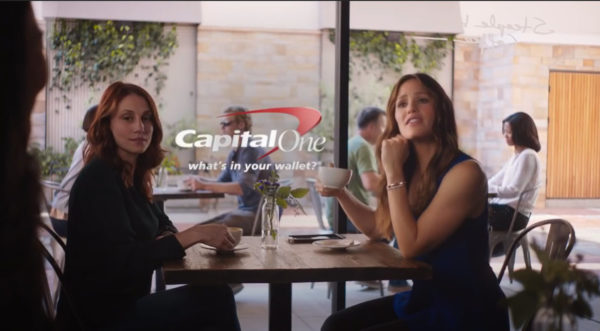
Like the business slogan that’s undoubtedly running through your head — just from seeing the image above — good business slogans are short, catchy, and timeless. Not everyone can come up with catchy one-liners like “got milk?” but you can still create a slogan that boosts your business.
If you are or work closely with an entrepreneur, you know just how much work goes into building a business from the ground up. It starts with an idea of a good or service people need. Then, you refine the idea, write a business plan complete with thorough market research, search for investors, register the business with the government and the IRS…and all that is just the tip of the iceberg!
Once all of that is complete, you and your budding business will have to tackle a new beast: branding and advertisement. It may be tempting to skimp here, but don’t underestimate how important developing a loyal following is, especially when you’re trying to get your business off the ground. You’ll need a company website, a social media presence, a logo, and the ever-important slogan.
Read on to find out why slogans are so significant, plus learn how to create one that effectively boosts your business.
What are business slogans?
A slogan, as defined by Merriam-Webster, is “a brief attention-getting phrase used in advertising or promotion.”
These are the catchphrases that get stuck in your head for days after you hear them on commercials or read them on billboards. The way these little mottos linger in your thoughts for hours or even days at a time is proof that slogans are key to effective marketing.
What makes a good business slogan?

Most of the popular business slogans have managed to stick around for decades — your parents heard them, you heard them, and now, so will your kids. But why is that so? How have these simple phrases managed to attain such longevity, and how can the slogan you create for your business and branding do the same?
The keys to developing a good business slogan lie in strategy and intention. Here are a few factors to keep in mind when you start the brainstorming process.
Memorability
The purpose of a slogan is to be remembered. It highlights your brand and its image. A good slogan sticks in your customers’ minds and immediately reminds them of you and your business. A few good ways to make your slogan memorable are to employ literary devices, like rhymes or alliteration.
Simplicity
Take a moment and think about the brand phrases that have stuck with you over the years. Notice how the most effective slogans are short. This is because brief and concise statements are usually more impactful than a wordy sentence that dances around the point it’s attempting to make.
Emotion
A feeling or emotion, whether positive or negative, is what spurs people to action. And because you want your slogan to urge consumers to interact with your brand, it must stir up a positive feeling inside of them. Maybe you make them feel relieved or secure, or perhaps inspired or empowered — just be sure the emotion evoked accurately represents the service or goods you offer.
Distinctiveness
A slogan that’s nearly identical to the one used by your competitor isn’t very effective, so you should be sure yours stands out. What can you offer consumers that others can’t? Make sure that’s communicated through the slogan you come up with.
Credibility
Consumers need to believe the slogan fits with your brand, so you’ll need to make sure not to over or undersell yourself. You shouldn’t, for example, market your inexpensive costume jewelry as the most elegant and beautiful pieces on the market. It also wouldn’t be wise to describe your inventory as cheap plastic accessories. Keep all branding and advertising honest.
Business slogans to inspire your creativity
Now that you’ve gotten a bit more insight into what makes a brand’s slogan effective, it’s time to look at a few real-world examples at work. Each of the brands and companies listed below has a slogan that ticks each of the boxes mentioned above, managing to be memorable, simple, unique, and credible, all while inciting a positive emotional response.
- “I’m Lovin’ It” – This iconic three-word phrase was coined by McDonald’s, and the image of the international fast-food franchise’s famous golden arches probably comes to mind as soon as it’s heard or read.
- “America Runs on Dunkin'” – Dunkin’ Donuts, often shortened to Dunkin’, launched the short slogan in 2006 as part of a nationwide movement to keep up with American citizens as they go about their busy lives.
- “Finger-Lickin’ Good” – Kentucky Fried Chicken’s slogan is over 60 years old. It reminds current and potential customers that the fast-food joint’s offerings are so delicious, they won’t want to leave even a single crumb behind.
- “Just Do It” – When paired with the brand’s legendary swoosh, these three short words inspire people not only to reach for their goals but also to buy Nike shoes and clothing that will help them achieve those goals.
- “Milk’s Favorite Cookie” – Nabisco branded Oreo as “milk’s favorite cookie” in 2004, though the chocolate sandwich cookie was around long before that. And a slogan that makes a declaration so bold is hard to beat.
- “Got Milk?” – This slogan originated in 1993 when the California Milk Processing Board made an effort to rebrand. You’ve probably seen these words printed on a photo of a celebrity donning a milk mustache and a wide smile.
- “Taste the Rainbow” – Skittles’ slogan is a nod to the fruit-flavored candy’s assorted colors, and when paired with its usually out-of-the-ordinary advertisements, Skittles is a name that is sure to stick in your mind.
- “Red Bull Gives You Wings” – Red Bull’s slogan implies that the drink, which burst onto the scene in 1987, gives a consumer so much energy, they could fly.
- “Because You’re Worth It” – This phrase was unveiled by L’Oreal in 1997 and since then has achieved legendary slogan status as it empowers, encourages, and appeals to women across the world.
- “The Happiest Place on Earth” – In an effort to convince visitors that the amusement park is a safe, positive place for people of all ages, Disneyland adopted the tagline “The Happiest Place on Earth,” and the nickname has stuck for decades.
- “The Breakfast of Champions” – This empowering slogan appears on the bright orange boxes of Wheaties cereal, usually accompanied by an image of an athlete or Olympian.
- “A Diamond is Forever” – Frances Gerety walked into a male-dominated boardroom and pitched this slogan for De Beers in 1947, and though it was initially met with uncertainty, it was chosen for the brand and changed the world of advertising forever. It was even named the Slogan of the Century in 1999.
- “You’re in Good Hands.” – You might have heard this slogan once or twice on a commercial — or maybe a few more times than that, since Allstate Insurance Company is such a well-known brand. The phrase was coined in the 1950s and has been associated with the company ever since.
- “What’s in Your Wallet?” – This popular line is from Capital One’s advertising campaigns, and it’s especially fitting as the brand entices consumers to rely on it for credit cards, loans, and other banking and money services.
- “Betcha Can’t Eat Just One.” – The iconic slogan for Lay’s potato chips is a challenge, daring fans of the food not to eat the whole bag in one sitting. The phrase was announced in 1963, and it’s been associated with the chips ever since.
Now that you’ve seen what works, it’s time to come up with a slogan of your own. Where do you start, you ask? Here’s a bit of helpful advice to help the creative juices flowing.
Tips for developing effective and unique business slogans
Research and get input
Before you sit down with a blank notepad and a pencil for a brainstorming session, you’ll need to start by doing some thorough research. Study the advertising campaigns of other brands within your industry, especially those that have managed to find success in the field. What are they doing well? What changes should they have made, and how can you do better during your branding endeavors?
If you’re unsure where to start here, remember you don’t have to endure the creative process on your own. Consider using a tagline generator to get some ideas and see what’s proven successful in the past, or enlist the aid of a marketing professional or design expert to come up with a few unique slogans to choose from.
There are even professional slogan writers for hire and plenty of options to choose from. If you go this route, however, you’ll need to be sure the contractor you choose to do this job for you has a pretty extensive background in writing sales copy; creating a slogan isn’t an easy job, and you need to be sure whoever takes on the task can be trusted to do it well.
Make sure it stands alone
A smart slogan does not need to be explained, so be sure the phrase you come up with makes sense on its own.
Sure, some people love elaborate backstories about how and why a business came to be, but that interest generally doesn’t come until they are already familiar with the business and its offerings. Since your slogan will be used as a tool for drawing in new interest, you’ll want to be sure it makes sense and gets the point across with no prior knowledge of the company’s history necessary.
Appeal to your desired market
Not only should you study your competitors, but you should also take the time to learn as much as you can about your target audience. For example, what kinds of things appeal to your prospective consumers, and how can you use what you find to your advantage? Market research is an important step to the slogan-developing process, as it won’t do you or your brand much good if the slogan you settle on does not appeal to the customers you want to attract.
The best way to learn about your target audience is to go straight to the source. If you’ve already established a following and have a steady group of consumers on your side, reach out to them for slogan ideas, perhaps offering an incentive if someone pitches a winning phrase, or use a survey tool to gather opinions.
Make it timeless
In some cases, playing on current events is an effective marketing strategy. For example, KFC found success during the coronavirus pandemic by temporarily pulling the “Finger-Lickin’ Good” slogan to encourage handwashing to prevent sickness. That was a rare exception due to an unexpected event, though.
A general rule of thumb is to select a business slogan that doesn’t need to change based on the time of the year or what’s happening in the world. Take Oreo’s “Milk’s Favorite Cookie” slogan, for example. There’s nothing in the phrase that refers to a certain time period, and there’s no need to change it based on a current event. That’s why the brand has been able to rely on the slogan for marketing and branding for decades.
Use humor or clever wordplay
It isn’t a dealbreaker if your chosen slogan isn’t particularly funny or witty. But considering how many brands have found success by using clever wordplay, double entendres, or making consumers laugh, it’s worth mentioning.
However, you should only lean heavily on humor and wordplay in the slogan if it makes sense for your brand or business type. Consumers can tell when the catchphrase of an advertising campaign feels forced or inappropriate, and that may unintentionally turn your desired audience away rather than draw them in. A fast-food joint may be able to get away with a cheeky joke, for example, but a more serious establishment like a funeral home probably could not.
Make it a call to action
As mentioned above, you want your slogan to incite a positive emotional response. You want people to feel moved by your brand’s word or phrase, so much so that they want to do something about it — and the thing you want them to do is to use your product or service.
Historically, calls to action (CTAs)are effective means of creating engagement, and at this point, they have almost become expected in a marketing or advertising setting. You’ll just need to be sure to use language that appeals to your desired consumers; otherwise, they’ll remain unmoved.
What do you do if you need to change your slogan?
You’ve finally done it. You studied effective marketing campaigns, researched your target audience, and worked hard to develop a slogan, but maybe you didn’t get the results you were hoping for. Perhaps your business evolved, and the slogan you initially chose for your brand no longer aligns with your products or services.
So, what do you do?
Of course, you can’t keep a slogan that is no longer serving its purpose! So you go back to the drawing board and start brainstorming a new slogan for your brand. Sometimes, this means scrapping what you have and coming up with something brand new; other times, you may only need to alter a word or two. How much of the slogan you update depends on your reasons for changing it, but no matter the reason, remember there’s strategy involved here, too.
Again, you’ll need to decide what makes your brand stand out from the rest and determine why your business is special among others. Consider what you’re offering your target audience, and decide how to better appeal to them.
Is having a slogan even worth the effort?
There are businesses and brands out there who have managed to make a name for themselves without the help of a catchy slogan, and at this point, you may be asking, “If they can do it, why can’t I?” And the truth is, you can if you’re willing to skip out on a highly effective marketing tool.
Without a slogan, you may have to work harder to establish your brand’s identity. This is possible, but having a short phrase that sums up your brand and its intentions can help you create brand recognition a bit more easily. Plus, since your slogan is unique, you guarantee that the identity you establish for your brand stands out, too. Brand identity is helpful when consumers need to choose between you and your competitors.
Next steps
While developing a slogan or tagline for your business or brand takes a lot of research, strategy, and creativity, you’ll find that the reward is worth the effort. These sentences or fragments are effective ways of making your business grow.
Just be sure to use the slogan effectively in your marketing campaigns. Don’t be afraid to print it on business cards, display it on your social media sites, and feature it on your website (preferably close to your logo).




